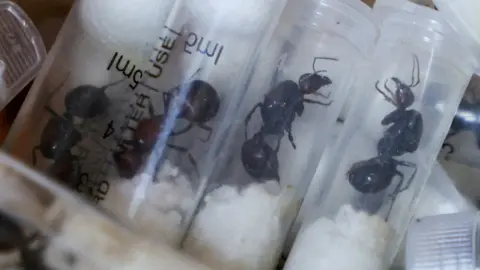A peculiar and surprisingly large-scale wildlife trafficking operation has reached its legal conclusion in Kenya, with a group of individuals facing sentencing for their involvement in the illicit trade of thousands of live ant queens. This case, while perhaps lacking the immediate notoriety of elephant ivory or rhino horn busts, highlights the diverse and sometimes unexpected targets of the illegal wildlife market.
The operation came to light when Kenyan authorities, acting on intelligence, intercepted packages containing an estimated 10,000 to 14,000 live ant queens. These were meticulously packed in small containers, destined for international markets, primarily in Europe and North America. The scale of the seizure was unprecedented for this type of trafficking, underscoring the organized nature of the ring.
Evidence presented during the trial revealed a sophisticated network. The ants, primarily from the Camponotus genus, were reportedly sourced from various locations within Kenya. Ant queens, being the reproductive cornerstone of a colony, are highly sought after by ant enthusiasts and collectors globally. Their value lies in their ability to establish new colonies, a popular hobby for many. The demand fuels a black market, as obtaining these queens from the wild is often subject to regulations and permits, and legal sourcing can be limited.
Investigators traced the operation back to a few key individuals who were responsible for the collection, packaging, and attempted export of the living cargo. The sentencing in a Kenyan court reflects the severity with which the authorities view this type of wildlife crime, regardless of the species involved. While the specific charges and sentences varied depending on the individuals’ level of involvement, they included fines and potential prison time.
The prosecution argued that the large-scale removal of ant queens from their natural habitats could have ecological consequences. Ants play crucial roles in ecosystems, from soil aeration and nutrient cycling to seed dispersal and pest control. While the immediate impact of removing thousands of queens is difficult to quantify precisely, conservationists expressed concern about the potential disruption to local ant populations and the broader ecological balance.
Furthermore, the case raises questions about the ethical considerations of the pet trade and the unregulated collection of wild animals, even seemingly innocuous ones like ants. The demand for exotic pets can drive illegal trafficking, impacting biodiversity and potentially introducing non-native species to new environments if escaped.
This sentencing in Kenya serves as a clear message that wildlife trafficking, in all its forms, will not be tolerated. It underscores the need for increased awareness about the diverse range of species targeted by illegal trade and the importance of international cooperation to combat these networks. While the focus often remains on charismatic megafauna, the “contraband crowns” of the ant world demonstrate that even the smallest creatures can become victims of this lucrative and damaging illicit market. The case highlights the need for continued vigilance and enforcement to protect all facets of biodiversity.
Email Us on editorial@nnafrica.com













